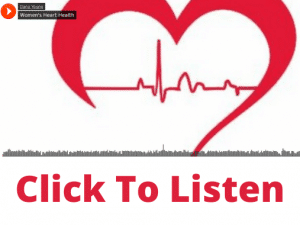February is American Heart Month and a time to take stock in our heart health. The statistics of people living (and dying) from heart disease in the United States is staggering. According to the Centers for Disease Control (CDC):
* Heart disease is the leading cause of death for men, women, and people of most racial and ethnic groups in the U.S.
* One person dies every 36 seconds in the U.S. from cardiovascular disease.
* 1 in 4 deaths per year in the United States are from heart disease.
Heart disease and stroke accounted for nearly one in four deaths in Iowa in 2020.
However, what many people don’t know is women often times experience heart disease differently than men. For example, women are less likely than men to experience chest pain as a symptom or warning of a heart attack. Instead, heart attack symptoms for women are more commonly:
* Dizziness
* Fatigue
* Nausea
* Pressure or tightness in the chest
* Stomach pain
Risk for Heart Disease
Family history of early heart disease is a risk factor that can’t be changed. If your father or brother had a heart attack before age 55, or if your mother or sister had one before age 65, you are more likely to get heart disease yourself.
Each risk factor greatly increases your chance of developing heart disease. But having more than one risk factor is especially serious because risk factors tend to “gang up” and worsen each other’s effects. These risk factors are:
* High Blood Pressure
* High Cholesterol
* Diabetes
* Inactivity (physically)
* Family history of early heart disease
* History of preeclampsia while pregnant
* Unhealthy diet
* Age (Women 55+)
Silent Killer for Women
Heart disease in women is called the silent killer because women and their doctors may not identify their symptoms as coronary heart disease symptoms, and consequently they may not be diagnosed and treated as quickly as men. For instance:
* Doctors less likely to refer women for diagnostic tests for coronary heart disease.
* Women are more likely than men to experience delays receiving an initial EKG, are less likely to receive care from a heart specialist during hospitalization and are less likely to receive certain types of therapy and medicines.
* Younger women are more likely than men to be misdiagnosed and sent home from the emergency department after cardiac events that occur from undiagnosed and untreated vascular heart disease.
Pregnancy and Heart Disease
When a pregnant woman has high blood pressure during pregnancy it can signal damage to other organs such as the kidneys. This condition is called preeclampsia. Although this risk you can’t control, you should work to control other heart disease risk factors because preeclampsia raises your risk for heart and blood vessel problems later in life.
Menopause and Heart Disease
Heart disease increases with age. Middle aged women tend to develop more risk factors for heart disease, in part due to increased weight and their body’s production of estrogen drops. Treatment with menopausal hormone therapy immediately after menopause may reduce risk of heart disease, but not of stroke.
Prevention – Get Heart Healthy
Here’s some key actions to get heart healthy:
* Stop smoking
* Get moving (physically that is)
* Improve your eating habits
* Check your blood pressure & cholesterol
* Improve sleep and reduce stress
* Aim for a healthy weight
Iowa Department of Public Health (IDPH) is working to reduce Iowa’s heart disease and stroke mortality and morbidity through awareness and programming for Iowans, including:
* Heart Disease and Stroke Program
* Iowa Care for Yourself WISEWOMAN Program
* Million Hearts Program
IDPH recommends talking with your healthcare provider about your risk for heart disease.
Click to listen to cardiologist Denise Hagau, MD, at Mercy One North Iowa Cardiology Care at the Mason City Clinic talk specifically about women and heart disease.

Up-to-date. Down-to-earth. Close to home. Lots of great reasons to make Mason City Clinic
your first choice for all your family’s specialty healthcare needs.
250 S. Crescent Drive, Mason City, IA 50401
Tel: 641.494.5200
Toll Free: 800-622-1411
Fax: 641.494.5403